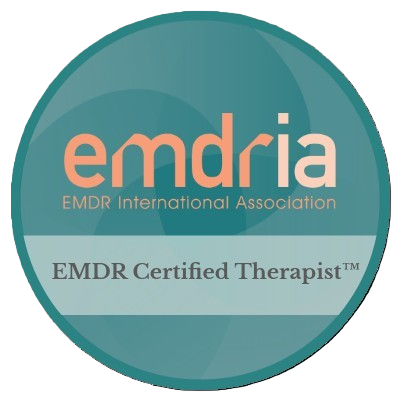EMDR Therapy and Intensives
(Trauma therapy)
We offer Eye Movement Desensitization Reprocessing (EMDR) therapy for clients in Waterloo, throughout Ontario and online. EMDR supports clients who are experiencing anxiety, trauma and PTSD symptoms. This therapy is also well-suited for people exposed to sudden traumatic events, or for professionals who experience secondary trauma such as officers, military personnel, medical and emergency responders, caregivers, and other frontline workers. EMDR intensives are offered as longer single sessions or as a series of sessions over a period of days.

What is EMDR?
EMDR stands for Eye Movement Desensitization Reprocessing and is an evidenced-based therapy that helps clients to access, process and release upsetting or traumatic memories.
Clients find relief from symptoms such as nightmares and disturbed sleep, intrusive thoughts, flashbacks, withdrawal, and somatic pain. EMDR is also a helpful therapy for people who feel ‘stuck’ in their identity or carry generalized feelings of shame.
EMDR uses physical movement (known as bi-lateral stimulation) to activate both sides of the brain. This natural process helps your brain to unlock, process and settle difficult memories so that it stops triggering ‘alarm bells’ unexpectedly in your day to day life.
Throughout the EMDR process, your therapist provides an anchor of compassionate support. Through this reprocessing, you will discover insights into your own identity and experiences that empower you to move forward with greater peace and confidence.
Meet Our Certified EMDR Therapist

Karen Walker
MSW, RSW, EMDR Certified Therapist™
Karen has worked with families in the Waterloo Region for over 20 years, specifically serving individuals facing family violence, sexual abuse, trauma, and attachment issues. Karen’s approach to therapy is holistic, honouring the relationship between the spirit, emotions, mind, and body. This multi-faceted approach to healing led her to pursue further training and certification in EMDR therapy.
“Trauma to a person can function like a virus in a computer network. It affects your body, your sense of self and your beliefs about your future by sending alerts of danger, even when the danger is no longer present. EMDR helps people access and address these experiences so that they can become ‘ordinary’ memories, no longer signaling danger. It is like removing the virus from your network, allowing your brain to healthfully file these memories and emotions without the accompanying triggers.”
“I firmly believe that healing is possible—because I’ve lived it. Through my own journey and the privilege of walking alongside clients, I’ve witnessed profound recovery from trauma, loss, broken relationships, and life’s most difficult moments.”
~ Karen Walker
EMDR Intensives – Feel better faster
EMDR intensives offer clients focused and accelerated times of healing through an immersive approach to their therapy. This model of treatment is well suited for clients who:
- Have recently experienced a traumatic or critical event
- Are addressing persisting, generalized negative beliefs that are often associated with anxiety and depression
- Want to address formative experiences, like core beliefs and traumas, from their childhood and family of origin
- Experience secondary trauma because of their profession, such as emergency responders, law enforcement officers, medical and military personnel, and other frontline workers
- Have unconventional work schedules, making longer or clustered appointment times more possible
Choose an EMDR Intensive format that fits with your schedule
Rather than a typical weekly or bi-weekly session, EMDR intensives offer a condensed timeframe for working with your therapist. These formats provide the practical advantage of adapting to your unique schedule and needs, making it easier for those who are not able to have weekly or bi-weekly sessions.
Three typical formats for EMDR intensives include:
- A 90 min – 2 hour session – An extended session that provides the time and space to process a specific target at greater depth than the traditional 50 minute session.
- Half-day sessions, 3-4 hours – This block of time can be used to focus on a particular target or to address several targets in a single session. Your therapist equips you with strategies and scheduled breaks that prevent overwhelm and support your progress toward accelerated healing.
- Clustered, daily sessions spanning several days or a week – With this concentrated approach, you can make meaningful progress without the interruptions that can between weekly sessions.
Who can benefit from EMDR?
EMDR is effective in supporting people in professions where trauma or vicarious trauma is possible, such as:
- Police officers
- Paramedics
- Fire fighters
- Military personnel
- Teachers
- Doctors and nurses
- Other forms of health care worker
- Mental health professional
It is also an effective intervention if you are experiencing PTSD, trauma, depression, anxiety, eating disorders or addiction.


EMDR and Christian Therapy
As a Christian counselling agency we recognize that, ultimately, healing for our spirits, minds, emotions, and bodies finds its source in God.
Therapies such as EMDR draw on the brain, body and relational connection that God has designed to help us process our difficult memories and experiences.
When you meet with a Christian counsellor for EMDR therapy, you are welcomed to include faith and prayer into your sessions. In this way, you can integrate all aspects of yourself into your healing and recovery.
Trauma, the Brain and EMDR
During a traumatic experience, our brains isolate upsetting memories and emotions as a natural form of protection so that it can focus its energy on getting through the experience. However, when stored in isolation, these memories stay active, giving off warning signals like lights and alarms, even when the danger has passed. These alarms can sound like negative beliefs about yourself or the world such as, “No one can love me,” “I am unlucky,” “I can’t trust anyone,” or “The world is dangerous.” When a different situation triggers that memory or emotion, the alarms go off, connecting all the old feelings and beliefs to the new experience.
In this way, people who have experienced trauma describe feeling caught off balance and controlled by memories and emotions that resurface unexpectedly. This often leads to coping strategies such as avoidance, self-criticism, control, hypervigilance, or self-medicating.
EMDR uses bi-lateral stimulation which works much like Rapid Eye Movement during sleep, helping your brain to refresh. Your therapist provides support and guidance to processes and repair the old memory. The result is much like turning off the alarm bell and storing the memory in a healthy way. When this happens, you are able to remember the past experience without reliving or being emotionally triggered by the experience.
Are you interested in learning more? Further your research at: www.emdria.org
FAQs about EMDR Therapy
Is EMDR a kind of hypnotherapy?
No. EMDR is not a form of hypnotherapy because it does not include altered states of consciousness or therapist-directed messages. During EMDR sessions, clients remain conscious, engaged and active in the process. It is the person, not the therapist who also discovers their voice and choice, choosing the pace and direction of their session.
How do I know if EMDR is right for me?
EMDR is just one of many forms of therapy that support mental and emotional health. When you contact our office, you can ask more about EMDR and schedule a time to speak with a therapist about it. Our goal is to support our clients according to their needs using the various tools in our training and practice.
Who should not do EMDR?
We must always stress that choosing a path for therapy is best made within a professional relationship. However, due to the nature of EMDR therapy, it may not best suited for clients in current situations of trauma or abuse, or for those experiencing psychosis or an active substance addiction. However, help and healing is always possible. Our therapists will work with you to find the emotionally-focused, trauma-informed and attachment-based care that is right for you.
What about health insurance?
Because of its unique format, it is a good idea to check with your health insurance provider about filing for coverage of EMDR intensives. Some insurance plans may not cover this service or may require specific procedures for claims of this kind.
Therapy & Counselling Services
Individual Therapy
We hold space for you to address and process the issues concerning you. Experience hope, healing and peace in a healthy, professional and confidential relationship.
Couples Therapy
Learn to attune to one another, communicate, and set healthy boundaries while working through the situations you are facing as a couple. Learn more in our FAQ section.
Family Therapy
We work with you and members of your family to strengthen your relationships by fostering attachment-based connections and healthy communication.
Children & Teens
We specialize in supporting children in their mental, emotional and social health in a way that is safe and engaging – meeting your child right where they are at.
Young Adults
We provide a non-judgemental space to help you discover your identity, learn how to handle stress and set direction for your future. Heal yourself and your relationships.
Art Therapy
Discover art therapy as an excellent choice to creatively express your internal emotions and process your experiences through colour and medium. No art expereince required!
Music Therapy
Tune in to your inner world through the creative space of music therapy. Explore the use sounds, lyrics and rhythm with your therapist to express your feelings and experiences. No musical training required.
Groups
We host groups for DBT Skills, Emotional Regulation, Parenting Workshops and more. Our facilitators create a safe learning environment and offer professional, practical and relatable support.
Prayer Counselling
Experience a form of counselling where you can engage your faith and spirituality as you address trauma, generational patterns, addictions, and emotional woundedness.

